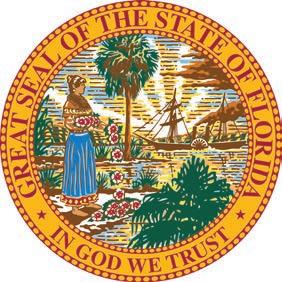
10 minute read
Healthcare Legislation Passed in 2019
HB 411: Nonemergency Medical Transportation Services
Vote: Senate 40-0; House 114-0 This new bill authorizes certain transportation network companies to provide nonemergency medical transportation services to Medicaid recipients under certain circumstances. The bill requires the Agency for Health Care Administration to update its regulations and policies to reflect such authorization, and to provide limitations on requirements for transportation network companies and its drivers.
Advertisement
HB 451: Nonopioid Alternatives
Vote: Senate 40-0; House 113-1 This bill establishes that every competent adult has the right of self-determination regarding healthcare decisions, including the right to refuse treatment with a Schedule II opioid controlled substance. It requires the Department of Health to develop and publish on its website an educational pamphlet regarding use of nonopioid alternatives for treatment of pain. It also provides requirements for healthcare practitioners prior to providing anesthesia or ordering, administering, dispensing or prescribing a Schedule II opioid drug to a patient in a nonemergency situation.
HB 501: Alternative Treatment Options for Veterans
Vote: Senate 40-0; House 114-0 This legislation authorizes the Florida Department of Veterans’ Affairs to contract with one state university or Florida College System institution to furnish alternative treatment options for veterans who have been certified by the U.S. Department of Veterans Affairs or any branch of the U.S. Armed Forces as having post-traumatic stress disorder or a traumatic brain injury. Alternative treatment options that may be provided under the bill include accelerated resolution therapy, equine therapy, hyperbaric oxygen therapy, music therapy, and service animal training therapy.
HB 549: Continuing Education for Dentists
Vote: Senate 36-0; House 113-0 This bill amends the Dental Practice Act to require that dentists complete two hours of dental continuing education on the safe and effective prescribing of controlled substances during every biennial license renewal period as part of the 30 hours in general dental subjects currently required by law.
HB 831: Electronic Prescribing
Vote: Senate 39-0; House 104-8 Healthcare practitioners who maintain an electronic health records system or who own, are employed by, or under contract with a healthcare facility or practice that maintains such system, must electronically transmit prescriptions for medicinal drugs upon renewal of the healthcare practitioner’s license or by July 1, 2021, whichever is earlier.
HB 843: Healthcare
Vote: Senate 39-0; House 115-0 This legislation establishes the Dental Student Loan Repayment Program to support dentists who practice in public health programs located in certain underserved areas and requires the Department of Health to establish the Donated Dental Services Program to provide comprehensive dental care to certain eligible individuals. It requires a hospital to notify a patient’s primary care provider within a specified timeframe after the patient’s admission. It requires a licensed facility, upon placing a patient on observation status, to immediately notify the patient of such status using a specified form. It also prohibits certain HMOs from employing step-therapy protocols under certain circumstances. It allows patients to stay up to 24 hours in ambulatory surgery centers. It also increases oversight of pediatric heart surgeries by letting a team of doctors make unannounced visits to struggling programs and review death records.
HB 1113: Health Insurance
Vote: Senate 37-1; House 105-2 This bill provides changes relating to health insurance coverage in the private sector, as well as the State Group Insurance program administered by the Department of Management Services to provide access to high quality care and services in a more cost-effective manner.
HB 1253: Prescription Drug Monitoring Program
Vote: Senate 39-0; House 111-0 This bill authorizes the Attorney General to introduce as evidence in certain actions specified information from the prescription drug monitoring program and have access to records for active investigations or pending civil or criminal litigation in certain cases.
SB 182: Medical Use of Marijuana
Vote: Senate 34-4; House 101-11 This law repeals a ban on smokable medical marijuana. It redefines the term “medical use” to include the possession, use, or administration of marijuana in a form for smoking. It also requires a qualified physician to submit specified documentation to the Board of Medicine and the Board of Osteopathic Medicine upon determining that smoking is an appropriate route of administration for a qualified patient.
SB 184: Aging Programs
Vote: Senate 40-0; House 116-0 The bill moves rule making authority for certain programs from the Department of Elder Affairs to the Agency for Health Care Administration. These programs include hospice care, assisted living facilities, adult family care homes, and adult day care programs.
SB 322: Health Plans
Vote: Senate 23-13; House 70-42 This bill allows insurers and HMOs greater flexibility in their plan design and product offerings providing options of affordable health coverage for employers, employees, and individuals. The bill also requires insurers and HMOs offering comprehensive major medical coverage to offer at least one policy or contract that does not exclude preexisting medical conditions if certain conditions are met.
SB 366: Infectious Disease Elimination Programs
Vote: Senate 40-0; House 111-3 Known as the Infectious Disease Elimination Act (IDEA), this legislation provides that a county commission may authorize a sterile needle and syringe exchange program. It expands the pilot needle exchange established in Miami-Dade County by allowing other counties to create their own programs with the approval of their county commissions.
SB 426: Firefighters
Vote: Senate 38-0; House 116-0 This bill allows firefighters who are diagnosed with certain cancers eligible to receive certain disability or death benefits. Specifically, in lieu of pursuing workers’ compensation coverage, a firefighter is entitled to cancer treatment and a onetime cash payout of $25,000, upon the firefighter’s initial diagnosis of cancer.
SB 732: Office Surgery
Vote: Senate 37-0; House 114-0 This bill authorizes the Department of Health to register and regulate office surgeries and requires an office in which a physician performs any of the following procedures to register with the department unless they are licensed under chs. 390 and 395, F.S.: a liposuction procedure in which more than 1,000 cc. of fat is removed; a Level II office surgery; or a Level III office surgery.
SB 1418: Mental Health
Vote: Senate 38-0; House 113-0 This bill implements two recommendations of a Department of Children and Families (DCF) task force on Baker Act cases involving minors. The first recommendation encourages school districts to adopt a standardized suicide assessment tool that school-based mental health professionals would implement prior to initiation of an involuntary examination. The second recommendation increases the number of days, from the next working day to five working days, that the receiving facility must submit forms to DCF.
SB 1460: Stroke Centers
Vote: Senate 39-0; House 114-0 This new legislation directs the Department of Health to include data from thrombectomy-capable stroke centers in its annual list of stroke centers and provide it to emergency medical service providers. The bill requires a hospital to submit documentation verifying its certification as a stroke center. The bill prohibits a hospital from advertising that it is a state-listed stroke center unless the hospital has submitted the required verifying documentation to the Agency for Health Care Administration (AHCA). If a hospital chooses not to be certified, or has not attained certification, the hospital must notify AHCA and the agency must immediately remove the hospital from the stroke center list.
Information obtained from the Florida Senate at www.flsenate.gov.


Continuing Education: Requirements & Licensure Renewal
The Department of Health (DOH) divides MDs into two groups. One group holds licenses that expire in even-numbered years, while the other group expires in odd-numbered years. All 40 continuing medical education (CME) hours (needed for second and subsequent renewals) must be American Medical Association (AMA) Category I or accepted American Medical Association Physicians Recognition Award. The Domestic Violence course and Prevention of Medical Errors course must be approved by any state or federal government agency, or nationally affiliated professional association, or any provider of Category I or II AMA Continuing Education. For other methods of obtaining continuing medical education per biennium, visit https://flboardofmedicine.gov/renewals.
First renewal:
• One hour of HIV/AIDS • Two hours of Prevention of Medical Errors (Course must include information regarding the five most misdiagnosed conditions. NOTE: Licensees of the Florida Board of Medicine are required to renew their licenses biennially in order to maintain the right to
Allopathic (MD)
practice.
Every renewal thereafter:
• Two hours of Prevention of Medical
Errors (Course must include information regarding the five most misdiagnosed conditions.) • Two hours of Controlled Substance
Prescribing (Required for medical doctors who are registered with the U.S. DEA. Must have been completed prior to Jan. 31, 2019 and each subsequent renewal.)
One hour of Human Trafficking (May be included in the total general hours required and must be completed by Jan. 1, 2021.) 38 general CME hours, including two hours of Domestic Violence for every third biennium
Exemptions:
Licensed physicians on active duty in the U.S. military who were in good standing with the board at the time of becoming active and were entitled to practice or engage in the practice of medicine in Florida may be eligible for exemption from renewal requirements for the duration of active duty, and for six months after discharge, but not to practice in the private sector for profit. For additional exemptions, visit https://flboardofmedicine.gov/ renewals.
Osteopathic (DO)
First renewal for licenses issued subsequent to July 1 of the second year of the biennium:
•
One hour of Florida Laws and Rules/Professional and Medical Ethics (live/participatory) Two hours of Prevention of Medical Errors (live/participatory) One hour of Human Trafficking (Only required to be taken one time, however it must be taken prior to Jan. 1, 2021. Counts towards total hours.) 40 total continuing medical education (CME) hours, including the required hours above. Of those hours, 20 must be American Osteopathic Association (AOA) Category 1-A hours. These hours may include any required course above if the required course is certified in Category 1-A by the AOA. Only 8 total home study hours may be used for renewal requirements. No more than 6 hours of CME can be used per biennium for attendance at a board meeting.
First renewal for licenses issued prior to July 1 of the second year of the biennium:
One hour of Florida Laws and Rules/Professional and Medical Ethics (live/participatory) Two hours of Prevention of Medical Errors (live/participatory) Two hours of Prescribing of Controlled Substances (Only applies to licensees registered with the DEA and authorized to prescribe controlled substances.) One hour of HIV/AIDS
One hour of Human Trafficking (Only required to be taken one time, however it must be taken prior to Jan. 1, 2021. Counts towards total hours.) 40 total continuing medical education (CME) hours, including the required hours above. Of those hours, 20 must be American Osteopathic Association (AOA) Category 1-A hours. These hours may include any required course above if the required course is certified in Category 1-A by the AOA. Only 8 total home study hours may be used for renewal requirements. No more than 6 hours of CME can be used per biennium for attendance at a board meeting.
Every renewal thereafter:
•
One hour of Florida Laws and Rules/Professional and Medical Ethics (live/participatory) Two hours of Prescribing Controlled Substances (Only applies to licensees registered with the DEA and authorized to prescribe controlled substances.) Two hours of Prevention of Medical Errors (live/participatory)

Two hours of Domestic Violence (Required every third biennium renewal.) One hour of Human Trafficking (Only required to be taken one time, however it must be taken prior to Jan. 1, 2021. Counts towards total hours.) 40 total continuing medical education (CME) hours, including the required hours above. Of those hours, 20 must be American Osteopathic Association (AOA) Category 1-A hours. These hours may include any required course above if the required course is certified in Category 1-A by the AOA. Only 8 total home study hours may be used for renewal requirements. No more than 6 hours of CME can be used per biennium for attendance at a board meeting.
Exemptions:
Any licensee who is a member of the U.S. military on active duty who was in good standing with the board at the time of becoming active and was entitled to practice or engage in the practice of medicine in Florida, you may be eligible to be exempted from renewal requirements for the duration of active duty, and for a period of six months after discharge, but not practicing the profession in the private sector for profit. For more exemptions, visit https://floridasosteopathicmedicine.gov/ renewals.






